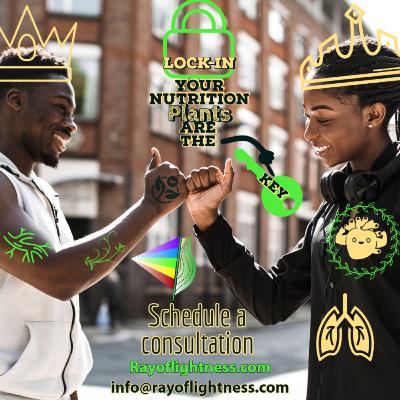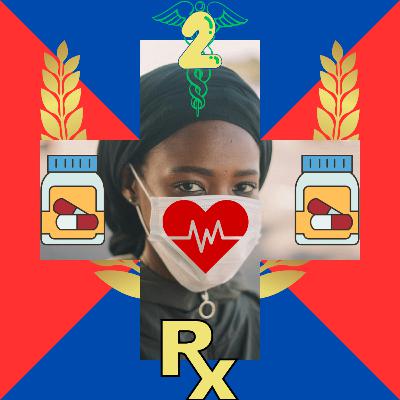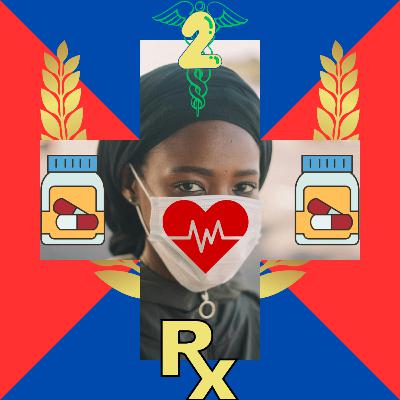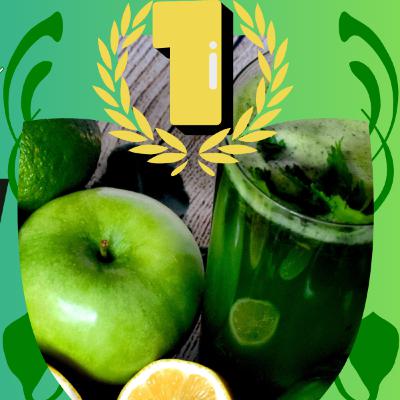Discover Ray on Health and Culture
Ray on Health and Culture

Ray on Health and Culture
Author: Ray of Lightness
Subscribed: 0Played: 0Subscribe
Share
© Ray of Lightness
Description
Welcome to "Ray on Health and Culture" (Title tentative) where we explore health, nutrition, and culture through the lens of Black American experiences. Hosted by a plant-based nutritionist and health educator, we cover topics from Black health history and the Soul Food Canon to food accessibility and global perspectives on plant-based nutrition and even more to come. Join us for inspiring discussions that empower you to take control of your health, identity, and well-being. Visit Ray of Lightness for more insights and services. Let's make health a shared journey.
18 Episodes
Reverse
We all carry frameworks that shape how we see the world but what happens when those frameworks turn into limits? This minisode of Ray on Health and Culture dives into the 'limited mentality' and why challenging it matters. Listen in and rethink with me.
Back stronger in mid-2025 ✨ In this minisode, I break down how social webs and social capital shape success, opportunity, and even our health. From travel to politics, I’m showing why building the right connections isn’t just networking: it’s life leverage. Ray on Health and Culture is still here, still dropping theory with practice to help you live sharper, healthier, and more intentional.
Are all processed foods bad? Not quite. In this episode, we break down the differences between processed, ultra-processed, and unprocessed foods—because the truth is more nuanced than social media trends suggest.We also dive into the dangers of following health trends and self-proclaimed experts who push misinformation. From ultra-processed additives that pose real health risks to the growing intolerance of food processing methods that are actually beneficial—like freezing for nutrient preservation—we explore how misinformation can lead to poor health choices.Balance is key. Eliminating certain highly processed foods can reduce health risks, but not all processing is detrimental. Tune in to learn how to navigate ingredient labels, use tools like Yuka, and make choices that support your health goals without falling for trend-driven fear-mongering.
In this episode of Ray on Health and Culture, we continue exploring what food accessibility truly means and how it can look different depending on the community. In part 1, we reviewed RFK's appointment by now-incoming president Donald Trump. Today, we discuss ways to adapt frameworks for addressing food needs by considering factors like community integration, local resources, and each neighborhood's unique challenges.
Using examples like the Healthy Corner Store Initiative, we describe how localized efforts can provide fresh food while addressing broader issues of equity. Along the way, we reflect on how understanding the dynamics of community knowledge and relationships can help create sustainable food systems. In addition, we also bring real-life examples of community food sharing and how even when applied individually can foster a healthy community.
We wrap up by touching on food justice, reminding us that achieving equity requires balancing both systemic change and community action. Tune in for practical insights and a fresh perspective on how food access can be reimagined for any neighborhood.
Don't miss out on this episode as the insights may offer an approach for now and for the upcoming USA administration.
As the New Year begins, many of us are thinking about fitness—whether it’s returning after a break or starting fresh. In this minisode of Ray on Health and Culture, we’re tackling the challenges and possibilities of reclaiming your movement goals with a balanced and compassionate approach.
From ergonomic adjustments to make movement part of your environment, to embracing non-linear progress as a sustainable resolution, I’ll share practical tips to ease back into fitness and stay motivated. Plus, we’ll highlight the importance of recovery periods, because sometimes resting is the best way forward.
This episode is your reminder that fitness is personal, progress isn’t a straight line, and there’s no better time than now to take that next step—big or small.
Several gymgoers have to navigate the world of fitness. The physical space of the gym is one of the most important but daunting places for many with image concerns or other areas of vulnerability. But how does this play out in current gym culture and what can we learn to evolve and cure the bad culture from gym culture? Tune in to this minisode to find out more!
During the September 10th, 2024 USA presidential debate, the voters heard the primary candidates speak on what changes and direction they would like to see in the country. Unfortunately, the moderators did not provide much time for the healthcare topic as many policyholders and uninsured alike seek out assistance or reprieve from the current USA healthcare environment.
Even worse, none of the two candidates spoke out on key issues such as nutrition, food availability, or even grocery prices on that matter. Therefore, the advocates will need to explain precisely and effectively which key health issues need to be addressed in order to make the USA a leading nation of health.
Tune in to this part of a multi-part episode where we discuss the impacts of food availability and why this issue is relevant within the current political climate and where future action may elevate our health conditions within our bodies and our local environment!
To note: while this is the formal start to the episode, the bonus episode covering the RFK addition to Trump's campaign may help inform on the perspective we are after here and why I am not pleased with the current healthcare suggestions for the country.
There is a strong emerging minority vegan voice within the Vegan movement. However, how come this voice does not receive the elevation or attention that it merits? Is it due to existing platforms opting for other narratives? Is it due to unconscious bias or lack of ethnic perspective? Regardless of the reasoning, everyone would benefit from learning about another viewpoint on Veganism. Vegans and non-vegans alike can also impact a variety of causes with an integrated perspective. Except, how can we build a "vegan" future together if we don't know the historical and current sociopolitical atmosphere?
Tune in to this episode to learn about current Vegan news media trends and how these trends should shift to include minority voices. If you are a vegan, questioning veganism, or wish to learn about the vegan perspective, this episode should have a takeaway for you.
After advocating for health professionals to engage in politics, I have to respond to the Robert F Kennedy endorsement and rally that the Republican candidate Donald Trump has acquired.
NOTE: I neither will endorse nor directly advocate for either primary candidate. I am merely reacting to the rally and providing a health advocate insight into the health politics within the United States 2024 Presidential election. Remaining exclusively on a health agenda, I find this discussion important for all health providers, advocates, stakeholders, or users within the US to have.
Once light on the health platform, RFK immediately adds a health agenda under the Trump campaign. In contrast, Harris has yet to have a major stance change or agenda that differs from the status quo. However: both campaigns also fail in other important areas within our healthcare system (ex. accessibility and style of healthcare). Except, what should the current health narratives be? Tune in to this episode to hear my thoughts on our current status on health politics and to potentially consider a new perspective.
P.S. This video is a gross overview and does not fully do justice to the various topics and ideas mentioned in the video. Universal Healthcare, Diabetes, and Holistic medicine are just a few of the topics mentioned that may warrant future episodes. Nutrition is the general theme for our health platform here and I hear how RFK wants to address these concerns. However, I would also need to look into his track record AND find more specifics on how he would head his department if brought in. Withholding judgment on his other platforms and philosophies, RFK has a health stance we can discuss and scrutinize as needed.
Our platform is also not full proof as we wish to have an evolving, nuanced, and engaged health platform while also standing for healthcare options and economic feasibility, access, and impact. Without any further adieu, please enjoy this episode!
With the conclusion of the Olympics, many people have several themes and topics on their minds as a result of the news coverage. One of those topics that have been reported involves France's decision to employ a plant-based dietary catering for the athletes. Therefore, Veganism has made headway into becoming more mainstream. But, does the development and the presentation of Vegan athletes and certain themes not say: Is the Vegan movement truly becoming a global concept?
Tune in to this special video clip where I discuss some of the Vegan-related topics stemming from the Olympics that ultimately address the question of Veganism on a global level.
Note: this clip was recorded during a longer discussion on Vegan Media that I will upload in the future.
For this Minisode, we touch on the topic of how one can approach dietary planning: daily or weekly. Each of these styles have strengths and weaknesses, but all can meet the health needs of each household if informed. Tune in to learn more details!
Within this Minisode turned into a “full length” episode, I discuss how the socialization and knowledge base we gain throughout our lifetime impacts our dietary patterns, actions, and dispositions towards food choices. Even within a medical perspective, this concept of diet/nutrition is important but sadly underutilized and uninformed which may lead to many social or medical consequences. I had developed an XY spectrum to better understand what any given dietary practice or disorder may land so that advocacy and understanding may be achieved. I also take time to discuss the settings of youth, teen, and adult dietary settings and include slight cultural commentary as well - especially on dietary tradition and customs. Typically lasting under 10 minutes, check out this special episode of the podcast to start that dialogue on how you were cultivated diet-wise.
Within this Minisode: we discuss the power and accessibility of health technologies and the potential to innovate or change health outcomes in the future. Some of the benefits include cost-effectiveness and community control. Downsides however, come within health knowledge barriers, and the potential to overlook racial differences (both within the medical world and outside). Whether you are well versed in the topic of health tech or completely new to the topic: this Minisode is worth the thought and listen. Thank you for tuning in!
Within this Minisode, I introduce the topic of environmental address and why the community’s environmental situation impacts the health outcomes of individuals that live within the community (ex. mental disposition). From there, I introduce a concept taught to me within my health certification program - SWOT analysis - and how the concept can be applied to begin prospecting the community and solutions/things to address to improve the living conditions around the environment. Although environmental issues may as first look indirectly tied to nutrition and physical outcomes, some things such as food vendors and space for self-sustenance intersect. Hope you all pick up inspiration for this holistic thinking and can reach out to your community stakeholders and leaders for resolution!
Within this short clip, I define plant based dieting how the academics would and give insight as to how to approach a switch in lifestyle.if you were looking for a sign to make the start to a plant-based (vegan) diet, I hope I can give you some tools here!
Within this Minisode, I make a quick breakdown of the three types of preventive care. Then, I make a case for chronicling the “Black Tertiary Care” system and advocate for a knowledge base on what items/foods we consume as tertiary care. With a direct and documented system, we can move to advocate or promote these items within our communities to obtain better health outcomes. Stop by and leave your thoughts in the Q&A
As a conversational thought: my father and I were discussing my frustrations within the current political climate. Within this dialogue, I reflect - or justify - my political engagement and why I follow politics so vehemently and why health professionals should be acclimated to political actions. Health Promotion requires advocacy and advocacy should not only be informed but also have a good faith bias. Attachment to the community’s well-being and level of consequence highlight why this concept should be explored in depth. Let how I connect it all during my Minisode on political agency and the black health status!
In this inaugural episode of "Ray of Health," we dive deep into the Black Health Narrative and explore the profound significance of the Soul Food Canon. With less than 6% of Black representation in any given health profession, it's vital to understand why the Black voice has often been muted in health conversations. We'll uncover the historical context of Black individuals within medical spaces, highlighting the abuse, mistreatment, and denial of prosperity that have shaped our health experiences.
Join me as I share my personal journey as a Black Health Education student, including a race-based situation I encountered in academia. I recount a discussion on the Tuskegee Syphilis Experimentation, where my teacher's dismissive comment, "All lives were impacted," starkly contrasted with the reality that only the Black community was disproportionately affected. This incident underscores the ongoing distrust and current consequences, including a scholarship awarded to the descendants of the experiment.
Drawing from Harriet Washington's "Medical Apartheid," we'll discuss how much of today's medical knowledge comes from unethical experimentation on Black bodies, and why this history matters. We emphasize the importance of self-efficacy and empowerment in overcoming these challenges and implementing solutions within our community.
We'll also explore the cultural and nutritional significance of traditional foods, advocating for the decolonization of our cuisine. While celebrating the richness of Soul Food, we'll address the health issues linked to high-oil, high-temperature cooking methods and propose ways to make our beloved dishes cleaner, greener, and more plant-based.
Looking ahead, we'll introduce the topic of our next episode on food accessibility and food mapping, touching on the Healthy Corner Store Initiative. This ties into the broader narrative of self-sustaining solutions within the Black economic system, including the potential of growing mushrooms indoors with minimal resources.
Tune in for an inspiring and informative discussion that blends personal anecdotes, academic insights, and practical advice for reclaiming our health and heritage.
Examples of Academic References in the episode:
Effect of a Plant-based Intervention Among Black Individuals in the Deep South: A Pilot Study; Samara R. Sterling, PhD, RD; Shelly-Ann Bowen, PhD; Journal of Nutrition Education and Behavior, Volume 55, Number 1, 2023.








